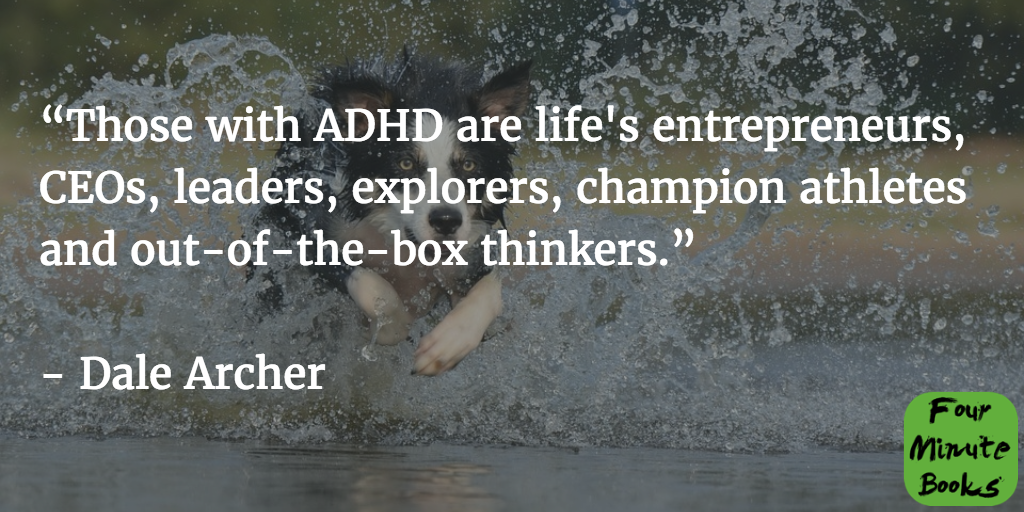1-Sentence-Summary: The ADHD Advantage sheds light on one of the most falsely assessed health conditions of the 21st century, by explaining how ADHD is overdiagnosed, overmedicated and why people with ADHD should embrace it as a means of success.
Read in: 4 minutes
Favorite quote from the author:

Audio Summary
Listen to the audio of this summary with a free reading.fm account*:
Dr. Dale Archer is many things: a doctor, psychiatrist, TV and radio show host, blogger, New York Times bestselling author.
But he’s also someone who suffers from a condition that affects over 6 million people in the US today: ADHD – Attention Deficit Hyperactivity Disorder. Setting the perfect example, Archer argues in this book that ADHD is not only under-explored, but also seen in the wrong light these days.
ADHD doesn’t have to be a crippling disease – it can be an advantage that helps you thrive and succeed.
Here are 3 lessons from The ADHD Advantage to help you deal with your or your child’s ADHD problems:
- 17% of all people, who have ADHD, don’t have ADHD.
- Whatever you do, don’t excessively medicate.
- Turn symptoms into advantages.
Ready to take on ADHD? Let’s do it!
Lesson 1: One out of every six people, who’s diagnosed with ADHD, doesn’t have it.
Out of all 6.4 million diagnoses of ADHD, up to 1.1 million might be falsely diagnosed. That’s one in six!
The reason medical science is horrible at diagnosing this disease is that the set of criteria used is terribly old and outdated. It’s a simple set of 12 symptoms, as soon as you have six of which, you’re diagnosed with ADHD.
You can’t just check a couple boxes to determine whether someone has this disease. Its symptoms are a lot more fluid. But it gets worse. Since children are the majority group suffering from ADHD, the diagnosis is usually made on account of the observer, not the victim.
It doesn’t help that all children are easily distracted, don’t pay a lot of attention, and are full of energy – that’s just being a child. But these natural behaviors are often falsely connected with ADHD.
Lastly, because there are seven times as many family doctors as there are ADHD specialists, it’s often the wrong doc making the diagnosis. Thus, ADHD is often the wrong diagnosis altogether.
Lesson 2: Don’t abuse ADHD medication.
I’m no doctor, and you should definitely read the book and consult an ADHD specialist, when it comes to your medication, but according to Dale Archer, ADHD medication is often abused and comes with terrible side effects.
The number of people falsely being prescribed ADHD medication is almost as big as the number of people falsely diagnosed (oh wonder).
Of course, that’s partially the fault of the pharmaceutical industry with its giant lobby. But ADHD drugs have addictive qualities as well, making it all the more difficult to get off them, once you’re hooked.
Even worse, they can offset growth and weight gain or loss. This is bad in adults, but in children, it’s devastating.
So whatever you do, don’t abuse ADHD medication or excessively medicate your child. There are much better ways to deal with it (and they don’t have to cost a cent).
Lesson 3: Turn your symptoms into your advantages.
For example, children with ADHD learn a lot better after exercising, so more exercise in school breaks is an easy way for them to focus.
Better yet: it makes them great at sports. Especially team sports often require paying attention to many different things. Take basketball, for example. You have to see who’s available, guess where the ball will be next, estimate opponents’ moves, figure out your own path across the field, and so on. Kids with ADHD switch the direction of their attention a lot, and this comes in handy in these types of situations.
This kind of lateral thinking also helps them make lots of creative connections and come up with innovative solutions to problems, for example a new angle to take a photo from or combining previously un-mixed ingredients in a cupcake recipe.
See? What was formerly a symptom now becomes and advantage.
If you have ADHD or your child suffers from it, you should list out all the symptoms you have and then try to find ways in which these can help you perform better.
Some of the world’s most successful people have done this and turned their ADHD from disease into advantage, for example Richard Branson, founder of the Virgin record label, airline, space program, and many other ventures, which have made him a billionaire.
The ADHD Advantage Review
I love it. The ADHD Advantage is a critical take on a disease, which is not only not taken seriously enough when it’s real (because so many people just show lighter symptoms), but is also even abused as an excuse. How many times have you heard someone say: “Oh yeah, I can’t focus, I must have ADHD.” What they’re really saying is: “I’m lazy, but I don’t want to admit it.” Any specialist would probably tell them that they don’t suffer from a disease, but from a short attention span, a very common thing these days.
I like that Dale Archer addressed not only this, but also how people with actual ADHD can thrive on it, instead of feeling like it’s a giant ball & chain that they have to drag around for the rest of their life.
Recommended!
Who would I recommend The ADHD Advantage summary to?
The 10 year old, who feels he’s an outsider in school, because he can’t sit still like the other kids, the 39 year old, who feels her job forces her to do one-sided activities for too long, and anyone who knows someone with ADHD.
Last Updated on August 1, 2022